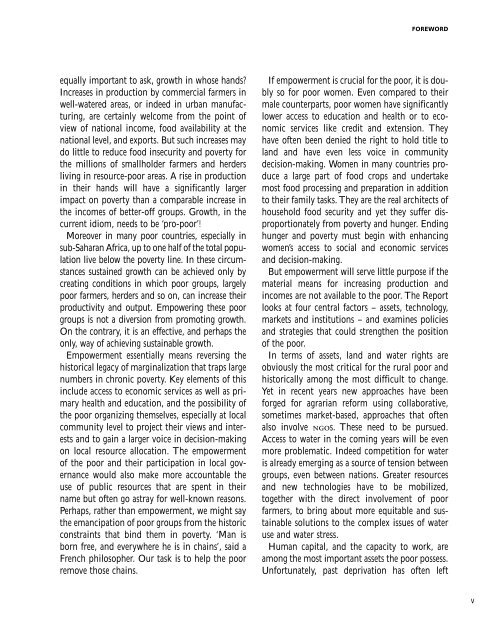THE CHALLENGE OF ENDING RURAL POVERTY - IFAD
THE CHALLENGE OF ENDING RURAL POVERTY - IFAD
THE CHALLENGE OF ENDING RURAL POVERTY - IFAD
Create successful ePaper yourself
Turn your PDF publications into a flip-book with our unique Google optimized e-Paper software.
FOREWORD<br />
equally important to ask, growth in whose hands?<br />
Increases in production by commercial farmers in<br />
well-watered areas, or indeed in urban manufacturing,<br />
are certainly welcome from the point of<br />
view of national income, food availability at the<br />
national level, and exports. But such increases may<br />
do little to reduce food insecurity and poverty for<br />
the millions of smallholder farmers and herders<br />
living in resource-poor areas. A rise in production<br />
in their hands will have a significantly larger<br />
impact on poverty than a comparable increase in<br />
the incomes of better-off groups. Growth, in the<br />
current idiom, needs to be ‘pro-poor’!<br />
Moreover in many poor countries, especially in<br />
sub-Saharan Africa, up to one half of the total population<br />
live below the poverty line. In these circumstances<br />
sustained growth can be achieved only by<br />
creating conditions in which poor groups, largely<br />
poor farmers, herders and so on, can increase their<br />
productivity and output. Empowering these poor<br />
groups is not a diversion from promoting growth.<br />
On the contrary, it is an effective, and perhaps the<br />
only, way of achieving sustainable growth.<br />
Empowerment essentially means reversing the<br />
historical legacy of marginalization that traps large<br />
numbers in chronic poverty. Key elements of this<br />
include access to economic services as well as primary<br />
health and education, and the possibility of<br />
the poor organizing themselves, especially at local<br />
community level to project their views and interests<br />
and to gain a larger voice in decision-making<br />
on local resource allocation. The empowerment<br />
of the poor and their participation in local governance<br />
would also make more accountable the<br />
use of public resources that are spent in their<br />
name but often go astray for well-known reasons.<br />
Perhaps, rather than empowerment, we might say<br />
the emancipation of poor groups from the historic<br />
constraints that bind them in poverty. ‘Man is<br />
born free, and everywhere he is in chains’, said a<br />
French philosopher. Our task is to help the poor<br />
remove those chains.<br />
If empowerment is crucial for the poor, it is doubly<br />
so for poor women. Even compared to their<br />
male counterparts, poor women have significantly<br />
lower access to education and health or to economic<br />
services like credit and extension. They<br />
have often been denied the right to hold title to<br />
land and have even less voice in community<br />
decision-making. Women in many countries produce<br />
a large part of food crops and undertake<br />
most food processing and preparation in addition<br />
to their family tasks. They are the real architects of<br />
household food security and yet they suffer disproportionately<br />
from poverty and hunger. Ending<br />
hunger and poverty must begin with enhancing<br />
women’s access to social and economic services<br />
and decision-making.<br />
But empowerment will serve little purpose if the<br />
material means for increasing production and<br />
incomes are not available to the poor. The Report<br />
looks at four central factors – assets, technology,<br />
markets and institutions – and examines policies<br />
and strategies that could strengthen the position<br />
of the poor.<br />
In terms of assets, land and water rights are<br />
obviously the most critical for the rural poor and<br />
historically among the most difficult to change.<br />
Yet in recent years new approaches have been<br />
forged for agrarian reform using collaborative,<br />
sometimes market-based, approaches that often<br />
also involve NGOs. These need to be pursued.<br />
Access to water in the coming years will be even<br />
more problematic. Indeed competition for water<br />
is already emerging as a source of tension between<br />
groups, even between nations. Greater resources<br />
and new technologies have to be mobilized,<br />
together with the direct involvement of poor<br />
farmers, to bring about more equitable and sustainable<br />
solutions to the complex issues of water<br />
use and water stress.<br />
Human capital, and the capacity to work, are<br />
among the most important assets the poor possess.<br />
Unfortunately, past deprivation has often left<br />
v

















